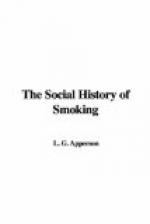In the preceding chapter I quoted from Addison’s diary of a retired tradesman in the Spectator of 1712. The periodical publications of a generation or so later paid the great essayist the flattery of imitation in this respect as in others. In the Connoisseur of George Colman and Bonnell Thornton, for instance, there is, in 1754, the description of a citizen’s Sunday. The good man, having sent his family to church in the morning, goes off himself to Mother Redcap’s, a favourite tavern—suburban in those days—or house of call for City tradesmen. There he smokes half a pipe and drinks a pint of ale. In the evening at another tavern he smokes a pipe and drinks two pints of cider, winding up the inane day at his club, where he smokes three pipes before coming home at twelve to go to bed and sleep soundly.
The week-end habit was strong among London tradesmen in those days. Another Connoisseur paper of 1754 refers to the citizens’ country-boxes as dusty retreats, because they were always built in close contiguity to the highway so that the inhabitants could watch the traffic, in the absence of anything more sensible to do, where “the want of London smoke is supplied by the smoke of Virginia tobacco,” and where “our chief citizens are accustomed to pass the end and the beginning of every week.” In the following year there is a description of a visit to Vauxhall by a worthy citizen with his wife and two daughters. After supper the poor man sadly laments that he cannot have his pipe, because his wife, with social ambitions, deems that it is “ungenteel to smoke, where any ladies are in company.”
Again, in the Connoisseur’s rival, the World, founded and conducted by Edward Moore, there is a letter, in the number dated February 19, 1756, from a citizen who says: “I have the honour to be a member of a certain club in this city, where it is a standing order, That the paper called the World be constantly brought upon the table, with clean glasses, pipes and tobacco, every Thursday after dinner.”
The country gentlemen of the time followed the hounds and enjoyed rural sports of all kinds, drank ale, and smoked tobacco. They had their smoking-rooms too. Walter Gale, schoolmaster at Mayfield, Sussex, noted in his Journal under date March 26, 1751: “I went to Mr. Baker’s for the list of scholars, and found him alone in the smoaking-room; he ordered a pint of mild beer for me, an extraordinary thing.” Gale himself was a regular smoker, and too fond of pints of ale.
Fielding has immortalized the squire of the mid-eighteenth century in his picture of that sporting, roaring, swearing, drinking, smoking, affectionate, irascible, blundering, altogether extraordinary owner of broad acres, Squire Western. We may shrewdly suspect that the portrait of Western is somewhat over-coloured, and cannot fairly be taken as typical; but there is sufficient evidence to show that in some respects at least—in his enthusiasm for sport and love of ale and tobacco—Western is representative of the country squires of his day.




